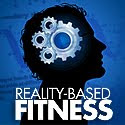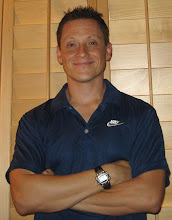Words.....have you ever thought about the power of words? Personally, I have been very affected (both positively and negatively) by another person's words; espescially when coming from an authority figure (a coach, teacher, or parent). This post will highlight the importance of thinking carefully of the words we use when dealing with clients, friends, loved ones, etc.
As a Fitness professional and a bodyworker, I am constantly dealing with many different types of people. Some are often in great pain or in a state of dis-stress. After studying the work of Australian-based Physiotherapist, David Butler, I have again been reminded of the power of words when it comes to explantions, especially with my clients in pain. But let's face it, who doesn't have some sort of regular aches and pains? And just because you have some discomfort, does it mean that you're necessarily injured?
Often, clients of mine will come in with laundry lists of medical diagnoses that have completely demoralized them. Phrases like "degenerated," "herniated," "compressed or slipped discs," "arthritis" and "bone on bone" to name a few can conjure up terriffying images for people of their present condition. For many, these descriptions can actually set up a worsening or "awfulizing" of the condition that lead to restrictions in movement due to fear of re-injury. This leads to de-conditioning that makes the person more susceptable to further injury; not good!
I often combat this information (epsecially if it is based on imaging studies: X-Rays, MRI's, and CT Scans, etc...) by mentioning the credible research that shows that many non-symptomatic individuals have the same "horrible" and "grusome" stuff show up on imaging studies; and that "wear and tear" is a normal and inevitable part of aging, yet it doens't have to hurt that much.
While watching a Mel Siff video a while back of a talk he gave at the 2001 or 2002 SWIS conference in Canada, I was taken by a study he mentioned done by an Italian researcher. The study basically concluded that any exercise that was perceived by an individual as dangerous, makes it that much more likely that he or she will get injured or have pain when performing the exercise; sort of a self-fullfillng prophecy of sorts. The same kind of thing happens with food: people don't look at food anymore and think food; they think "trans fats" and "good carbs" and "bad carbs" along with proein, fat, fiber issues. While some of this nutritional education is needed (given the present dietary state of the Western World), some of it has probably led to more and more grief and less pleasure when eating even healthier foods.
This is why we need to be very careful with how we word our statements because they can have either very positive or very negative effects. An example of this is taking the corrective exercise stuff too far...Back in the late 90's, my brother and I were really sucked into the Paul Check stuff, which is actually great stuff minus a few parts. The few parts that really stuck out as negative were the ridiculous all day assessments that the Chekerians performed which basically showed how messed up (and therefore dysfunctional) you were. It was kind of demoralizing and made some people paralyzed (paralysis by analysis), depressed, and utterly afraid to move.
Now from this information you were then given the supposed Holy Grail of exercise to help your problem, but the results were not always so great (those who've done lots of corrective exericse know what I mean). In reality, many people do need some "corrective" actions for helping certain physical (and mental) issues/problems. These actions need to be made in a postive and supportive context however for the effects to be postive.
Saturday, December 1, 2007
Subscribe to:
Post Comments (Atom)







6 comments:
good post keats and very apt. One thing I think people( the clients as well as the trainers, therapists) sometimes to forget to factor in is that things HEAL. When Docs or others make pronouncements of 'how things are' they often times forget to inform those people that healing is not only possible but very possible and probable.especially if one takes specific actions, both physical and mentally to promote it.
Well put Mark. Yes, the body has amazing healing potential. Often the pain (and swelling, heat, stifness, etc.) we experience is just a short-term solution for the body to work it's magic.
Most people who have had serious injuries (like you) will always have something "show up" on imaging studies. But it doesn't really tell the entire story at all as far as the person's functional capcity. This as many of us know, lies somewhere in the brain and nervous system and is also extremely affected by current emotions and psychological state.
A person's attitude towards his/her injuries is probably one of the most significant factors in determining healing potential.
"A person's attitude towards his/her injuries is probably one of the most significant factors in determining healing potential."
absofreakinglutley! this is true for sure.
Keats,
Awesome post man! As we know from our earlier years, perception is so huge, especially when working with clients. You can almost program your clients per say...to either be empowered to move and train and be healthy........or to be hurt, rehabing and sick....
We both know that nothing beats brutal honesty with others and oneself, but, ENCOURAGEMENT truly is the OXYGEN of the soul. I choose to find the positive with clients and encourage them that their challenges can be overcome!
Great Post!
Rif, Great note on how things will and do heal. Nothing is static, things are always in flux....people do get better!
In Z Health we use the term "neural chunking" since the brain is always learning and combining "stuff"
Yep, the body does heal and changes over time. If an athlete is moving fine then I would say in general they don't have a problem. I've busted my ankle, torn my right shoulder completely out, separated my left shoulder, blah blah blah, but I don't consider it any issue any more and most of the time forget completely about it.
Plus as you pointed out, with newer imagining we need to really look and see what is truly "normal" and not what we think is normal. You will find this to be especially true with low back pain (well, with pain in general since it lives in the brain).
Excellent post!
Rock on
Mike N
Good stuff everyone! I was just saying on my blog a while back I NEVER thought of myself for one second as someone "with a bad back" even though I had lots of debilitating episodes.
More to the point, it is the meaning- images and feelings people associate to the words, especially those uttered by an authority, that create the harm. This whole topic is a fascinating one. It is explored in depth in the coaching training I just finished (wellcoaches.com)
To summarize what they teach about this: "words create worlds"
Post a Comment